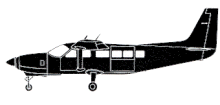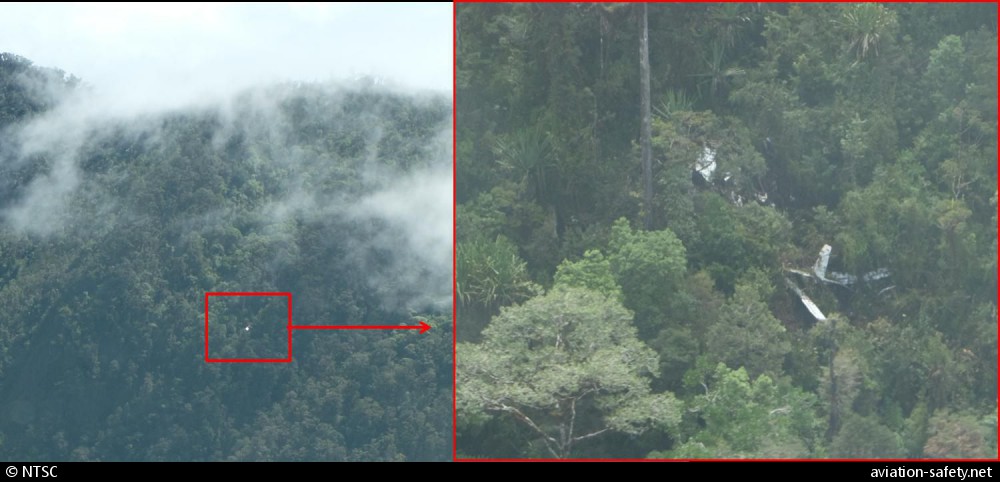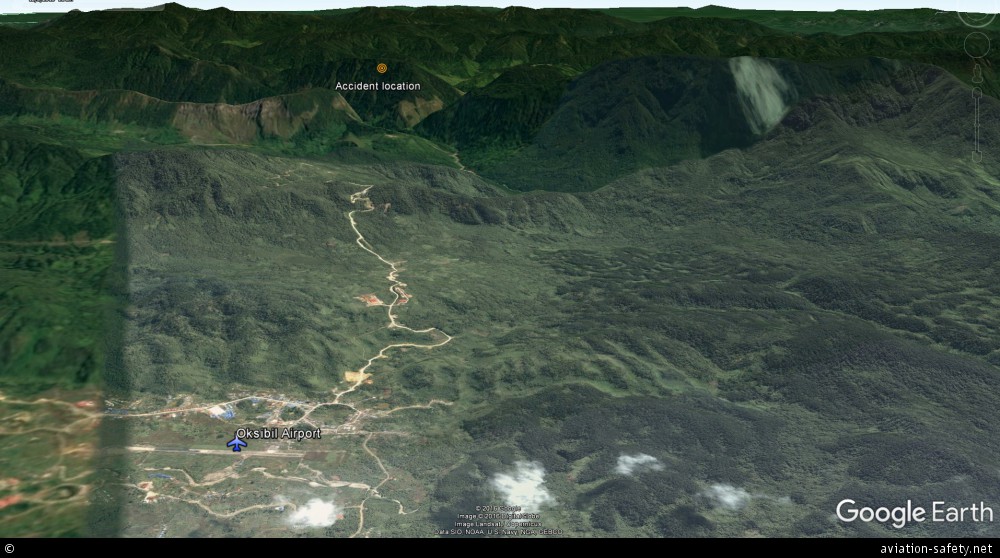
| Date: | Wednesday 12 April 2017 |
| Time: | 12:40 |
| Type: |  Cessna 208 Caravan I |
| Owner/operator: | Spirit Avia Sentosa |
| Registration: | PK-FSO |
| MSN: | 20800313 |
| Year of manufacture: | 1991 |
| Total airframe hrs: | 6226 hours |
| Cycles: | 8668 flights |
| Engine model: | Pratt & Whitney Canada PT6A-114A |
| Fatalities: | Fatalities: 1 / Occupants: 1 |
| Aircraft damage: | Destroyed, written off |
| Category: | Accident |
| Location: | 13 km N of Oksibil Airport (OKL) -
 Indonesia Indonesia
|
| Phase: | En route |
| Nature: | Cargo |
| Departure airport: | Tanahmerah Airport (TMH/WAKT) |
| Oksibil Airport (OKL/WAJO) | |
| Investigating agency: | NTSC |
| Confidence Rating: |
The Cessna 208 aircraft registered PK-FSO, was being operated on an unscheduled cargo flight from Tanahmerah Airport to Oksibil Airport in Papua, Indonesia. On board the aircraft was one pilot, 1,225 kg of general cargo and 800 lbs of fuel.
At 11:44 hours local time, in daylight conditions, the aircraft departed Tanahmerah and cruised at altitude of 7,000 feet. Estimate time arrival at Oksibil would be 12:24.
At 12:12, when the aircraft position was about 45 NM north of Tanahmerah, the aircraft passed another Cessna 208B aircraft from the opposite direction from Oksibil to Tanahmerah. The Cessna 208B pilot advised to the pilot via radio that the PK-FSO aircraft was in sight. The pilot responded that the aircraft was maintaining 7,000 feet on direct route to Oksibil.
The pilot failed to contact the Oksibil air traffic controller and failed to arrive at the destination. The airline's flight following officer received an emergency signal with a last recorded position of 6 NM north of Oksibil.
The next day the aircraft was found on a ridge of Anem Mountain at a height of 7100 feet. The aircraft was destroyed by impact forces and the pilot was fatally injured.
The investigation learned that two days prior the occurrence, the pilot travelled on a night commercial flight. This might have resulted in a sleep disturbance during the window of circadian low and an increase of the potential of fatigue. There are indications that the pilot did not have the required adequate restorative sleep before he started flying on the accident day. Prior to the occurrence flight, the pilot had flown for 3 flight sectors, with total flight hour of 2 hours 55 minutes. The multiple take-offs and landings that day increased fatigue.
Based on the final flight track, the absence of voice communication, the weather condition permitting the pilot to identify the airport location and the aircraft wreckage, consistently indicated that there were no pilot activities to fly the aircraft after the last known pilot activities at about 29 Nm from Oksibil until impact.
Colleagues of the pilot reported that he often smoked in the cockpit during the flight, looked sleepy and engaged the Terrain Inhibit switch which disabled the GA-EGPWS function while flying. This prevented any prior warning when the aircraft neared Anem Mountain.
This known behavior was not reported to the Operation and Safety department, so no action could be taken.
Contributing Factors: "The possibility of the pilot being fatigue, physical and environment condition increased pilot sleepiness which might have made the pilot inadvertently falling asleep indicated by no pilot activity. The absence of GA-EGPWS aural alert and warning was unable to wake up the pilot."
Accident investigation:
 |
|
Sources:
Location
Images:

photo (c) NTSC; 13 km N of Oksibil Airport (OKL); April 2017

photo (c) Google Earth; 13 km N of Oksibil Airport (OKL); 12 April 2017
Revision history:
| Date/time | Contributor | Updates |
|---|
The Aviation Safety Network is an exclusive service provided by:


 ©2024 Flight Safety Foundation
©2024 Flight Safety Foundation